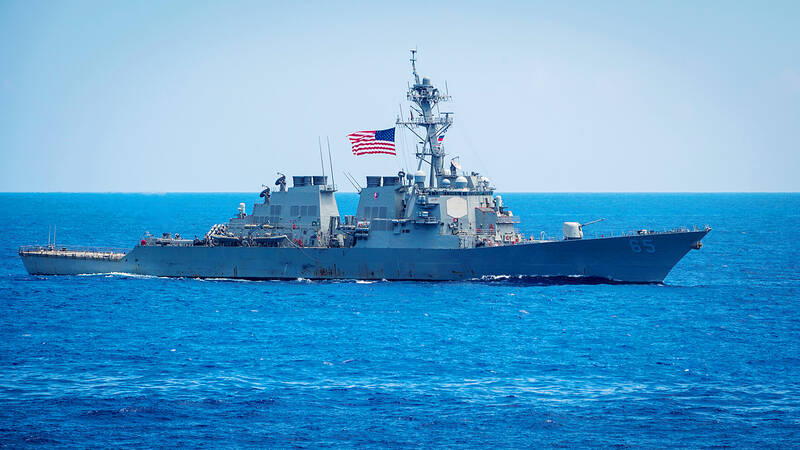The Philippines would let the US use its military bases in the event of a conflict in the Taiwan Strait, as long as it is “important” to the nation’s “own security,” Nikkei Asia reported yesterday.
In a recent interview with the Japanese news magazine, Philippine Ambassador to the US Jose Manuel Romualdez also urged restraint, saying that “nobody wants to have any kind of war or confrontation.”
“We want to ask both countries to lessen the tension by having more dialogue and then trying to resolve all of these issues, because it’s in our part of the world,” said Romualdez, a relative of Philippine President Ferdinand Marcos Jr.

Photo: Reuters / US Navy
Former Philippine president Rodrigo Duterte had floated the idea of letting the US use his nation as a staging ground during a Taiwan conflict, but there has been little sign of formal talks on the issue, Romualdez told Nikkei.
Manila and Washington are also in talks to increase the number of bases US forces can use, he added.
Under the 2014 Enhanced Defense Cooperation Agreement (EDCA) between the two nations, the US can maintain a rotating military presence at five Philippine bases.
“Our military and the military of the United States are all looking into what are the possible areas,” Romualdez said, adding that it might include a naval base.
A Pentagon spokesperson told the magazine that the two sides “hold regular discussions on deepening our enduring security alliance.”
“Looking ahead, we seek to enhance the posture of our alliance to address new and emerging challenges,” the spokesperson said. “We intend to continue to implement infrastructure projects at current EDCA locations and explore additional sites for further development.”
When China staged military drills around Taiwan following US House of Representatives Speaker Nancy Pelosi’s visit on Aug. 2 and 3, one of the zones it used extended into the Philippines’ exclusive economic zone, according to the US think tank Center for Strategic and International Studies.

INVESTIGATION: The case is the latest instance of a DPP figure being implicated in an espionage network accused of allegedly leaking information to Chinese intelligence Democratic Progressive Party (DPP) member Ho Jen-chieh (何仁傑) was detained and held incommunicado yesterday on suspicion of spying for China during his tenure as assistant to then-minister of foreign affairs Joseph Wu (吳釗燮). The Taipei District Prosecutors’ Office said Ho was implicated during its investigation into alleged spying activities by former Presidential Office consultant Wu Shang-yu (吳尚雨). Prosecutors said there is reason to believe Ho breached the National Security Act (國家安全法) by leaking classified Ministry of Foreign Affairs information to Chinese intelligence. Following interrogation, prosecutors petitioned the Taipei District Court to detain Ho, citing concerns over potential collusion or tampering of evidence. The

‘FORM OF PROTEST’: The German Institute Taipei said it was ‘shocked’ to see Nazi symbolism used in connection with political aims as it condemned the incident Sung Chien-liang (宋建樑), who led efforts to recall Democratic Progressive Party (DPP) Legislator Lee Kun-cheng (李坤城), was released on bail of NT$80,000 yesterday amid an outcry over a Nazi armband he wore to questioning the night before. Sung arrived at the New Taipei City District Prosecutors’ Office for questioning in a recall petition forgery case on Tuesday night wearing a red armband bearing a swastika, carrying a copy of Adolf Hitler’s Mein Kampf and giving a Nazi salute. Sung left the building at 1:15am without the armband and apparently covering the book with a coat. This is a serious international scandal and Chinese

Seventy percent of middle and elementary schools now conduct English classes entirely in English, the Ministry of Education said, as it encourages schools nationwide to adopt this practice Minister of Education (MOE) Cheng Ying-yao (鄭英耀) is scheduled to present a report on the government’s bilingual education policy to the Legislative Yuan’s Education and Culture Committee today. The report would outline strategies aimed at expanding access to education, reducing regional disparities and improving talent cultivation. Implementation of bilingual education policies has varied across local governments, occasionally drawing public criticism. For example, some schools have required teachers of non-English subjects to pass English proficiency

TRADE: The premier pledged safeguards on ‘Made in Taiwan’ labeling, anti-dumping measures and stricter export controls to strengthen its position in trade talks Products labeled “made in Taiwan” must be genuinely made in Taiwan, Premier Cho Jung-tai (卓榮泰) said yesterday, vowing to enforce strict safeguards against “origin laundering” and initiate anti-dumping investigations to prevent China dumping its products in Taiwan. Cho made the remarks in a discussion session with representatives from industries in Kaohsiung. In response to the US government’s recent announcement of “reciprocal” tariffs on its trading partners, President William Lai (賴清德) and Cho last week began a series of consultations with industry leaders nationwide to gather feedback and address concerns. Taiwanese and US officials held a videoconference on Friday evening to discuss the